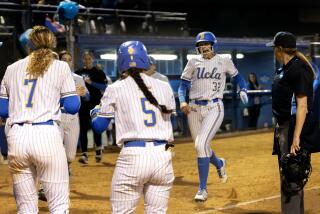Pin Your Hopes on This Student-Athlete
- Share via
OK, all of you, and you know who you are, who laugh a cynic’s laugh at the concept of “student-athlete,” here’s a Day in the Life of an Honest-to-God Real Student-Athlete:
Up at 7:30 in the morning, scramble for breakfast, go to the gym for two hours.
From 10 a.m. to 3 p.m., in pursuit of a sociology degree, with a moment out for lunch, run to classes in theater, Mezzo-American civilizations, world architecture and social stratifications.
An hour’s rest until 4 p.m.
Then two more hours of workouts and practice, followed by dinner, followed by weightlifting and/or running, followed by study, followed by a real waste of good time, sleep.
You’ll pardon me now, but I feel a need, having typed that schedule, to take a nap myself.
And we’re not talking life at Jock Tech U. This is Harvard.
This is Jesse Jantzen, 22, a senior, the greatest wrestler in school history, three times an All-American (with a 114-6 record in those seasons), this year’s NCAA 149-pound national champion (38-1), and, beginning with regional trials next week, a candidate for this summer’s U.S. Olympic team.
To hear his coach, Jay Weiss, you’d think Jesse Jantzen is a 21st century version of Frank Merriwell, the fictional Yalie who stood for everything good and right in athletics and academics. Words such as “integrity” and “sportsmanship” and “helpfulness” and “sense of humor” fill the sentences when Weiss goes on about Jantzen.
“Sounds like a dream kid,” I said.
To which the coach responded, “Even more so.” In this era of the rap sheet in big-time college sports, when it seemed the NCAA was little more than a gang of miscreant coaches and athletes, we offer Jesse Jantzen as counterbalance. “An outstanding role model,” Weiss calls him, “who exemplifies the ideals of Harvard, athletically and academically.” Besides, he can pancake you.
As in pick you up, flip you over.
Which is what he did in his long-awaited national championship match against Oklahoma State’s Zach Esposito. Here’s Weiss’ account: “All year it looked like that would be the final match, but we didn’t talk to Jesse about it until the day of the match. The game plan was to be aggressive from the start, to take it to Esposito. And Jesse went right after him.”
Weiss’ vivid recital included phrases such as “into the mix” and “pancaked him inside 15, 20 seconds” and “got right on top” and “put him on his back” and “nearly a pin.” As for a layman’s translation of all that wrestling talk, the coach supplied two words.
“It was, like, ‘HOLY COW!’ ” he said.
Harvard’s first NCAA wrestling champion in 66 years, Jantzen also was the school’s only Academic All-American this season. Good stuff, all that. And Jantzen calls the national championship the biggest deal in his career, saying, “It was a little disappointing the two previous years to get thirds.”
But Weiss can’t summarize Jantzen so neatly. “Really, it’s not just one thing about Jesse. It’s everything. His work ethic is it. It’s unmatched. Every time I’d be worried that he was overtrained, he never was. We never had to push him; we had to hold him back. Whatever his threshold for work was, he apparently never reached it.”
When the wrestlers did their seven-mile runs, Jantzen finished first. When they ran the stadium steps, Jantzen finished first. “He has stretched his comfort zone for so long that he can endure more than you think possible,” Weiss says.
“It’s like Tiger Woods and Michael Jordan. They’re gifted -- and when they work, they stretch their comfort zones.”
There’s no explaining an athlete’s willingness to endure the pain of training. Or is there? We might start with Jantzen’s idea of what work is, and here he cites role models who stared down pain: cyclist Lance Armstrong and the late distance runner Steve Prefontaine.
“But, especially, my dad,” he said. A college wrestler himself, Don Jantzen is now the head coach at Long Island’s Shoreham-Wading River, his son’s old high school. He was an assistant there in Jesse’s time.
“He set the work-ethic example for me very early,” Jesse says.
In seventh grade, Jesse Jantzen wrestled in competition against high school seniors. When Weiss became head coach at Harvard, then a pale facsimile of a big-time program, the last thing he needed to hear was someone saying, “Jay, there’s this eighth-grader you ought to take a look at.” An eighth-grader? Four years away? We need help now.
But the recommendation came from a former Harvard All-American, Andrew McNerney. Intrigued, Weiss watched video of the eighth-grader. And was hooked on Jesse Jantzen. He saw in the child a maturity, manner and skill beyond his years. He saw a prodigy.
From seventh grade through his career at Harvard, Jantzen won 352 of 368 matches. Next: the Olympics. He’ll try this year. He’ll try again in 2008.
“And,” he said, a smile in his voice, “maybe longer.”
One thing more. “Jesse,” I said, “that schedule of yours doesn’t seem to leave much time for parties.”
He said, “After the work. Plenty of time then for celebration.”


